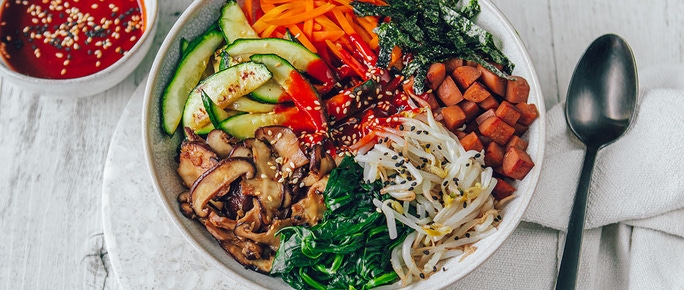
Can meat alternatives provide the protein I need?
There are so many good reasons to go plant-based. Whether you’re making a diet switch for the environment, eating for better health, just love the taste of all that plant goodness, or… all of the above!
As more of us migrate from ‘Meat free Mondays’ to cutting back on meat throughout the entire week, the vegetarian options available at the supermarket have gone gangbusters.
As well as loads of tasty whole foods, there’s now a smorgasbord of meat alternatives to choose from providing a tasty choice to help switch family favourite recipes to plant-based and take away the cravings for a burger or a sausage sandwich.
Meat alternatives are usually made from a variety of plant proteins including soy, lentils, beans, chickpeas, grains, nuts, and seeds. While some are literally an alternative to meat, other varieties are created to mimic meat right down to the look, texture and taste. These often come in the form of mince, burgers, sausages or schnitzels. There’s now even products that taste like chicken and fish on the meat alternative menu.
Are meat alternatives healthy?
Meat alternatives tend to be lower in kilojoules and lower in saturated fat compared to animal meat sausages or burgers. As they are plant-based, many products also provide fibre.
When shopping for a meat alternative, dietitians recommend choosing products fortified with zinc, iron and vitamin B12 – essential nutrients often found in animal foods.
Can meat alternatives provide the protein I need?
Most meat alternatives have higher or comparable protein to their meat counterparts.
A comprehensive report by Food Frontier checked out meat alternative products in Australia and New Zealand supermarkets. It found 82% of meat alternatives were a good source of protein, providing at least 10g of protein a serve.
Plant-based sausages were found to have more protein than meat varieties, burgers were on par, while plant-based mince is the only meat alternative category with less protein than the animal meat version.
On average, women need around 46g protein a day while men require a little more at around 64g a day. Meat alternatives can certainly help hit the mark. A plant-based burger patty on a wholegrain bun with salad can provide as much as 30g protein in one meal.
Alternative meat category | Average protein content per 100g* |
Burger patty | 14.7g |
Mince | 22.5g |
Sausage | 16.3g |
Chicken (uncrumbed) | 18.6g |
*Data from the Plant-based Meat: A healthier choice? Food Frontier 2022.
Is the protein quality the same?
There are 20 different amino acids in foods, including nine ‘essential’ amino acids that we need to get from the protein we eat. If a food contains all nine of the ‘essential’ amino acids in adequate amounts, it is called a complete protein.
Subscribe to Wholicious Living to stay up-to-date with the latest health and nutrition advice.
It’s often argued animal proteins are better because they contain all nine essential amino acids. These arguments are based on an inaccurate belief that plant foods are completely devoid of some essential amino acids.
But in fact, research shows all plant foods contain all the non-essential amino acids, however different plant foods may be low in one or more of them compared to what the body needs.
Therefore, having a variety of different plant protein foods each day as part of a healthy balanced diet will provide enough of all the essential amino acids you need.
Looking for more ways to add plant-based proteins to your diet? Check out our meat alternative recipe collection.

The latest nutrition advice, plus health and wellness tips delivered to your inbox monthly
